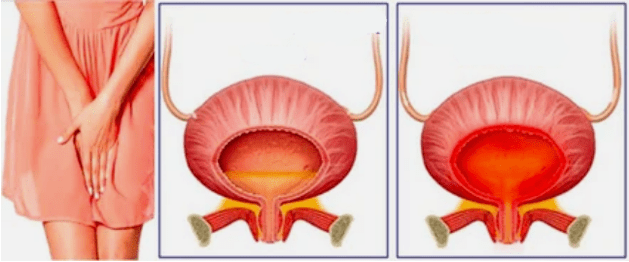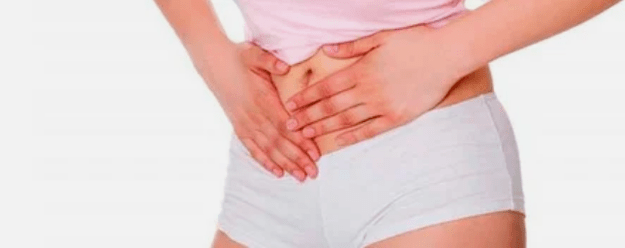Chronic cystitis is a "special" disease that every tenth woman suffers.Often, after 1-2 weeks, he encounters a new aggravation.After the process of antibiotics.
What is the matter and how to overcome the disease?In order to get a clear answer to these questions, you need to understand what chronic cystitis they are provoking and what happens in the bladder.
Chronic cystitis - truth lies in the cause of inflammation

Chronic cystitis is a collective concept that is only the result of many diseases.At the same time, the inflammatory process develops for more than 2 months and affects not only the blistering mucosa membrane (as with acute inflammation), but also the deep layers.
The treatment of the disease is only in vain with antibiotics such as acute inflammation.Mitigation of the pain - only to deceive yourself, agree to temporary relief.Meanwhile, the disease will continue to develop, and sooner or later the pain will noticeably "deny" life.We offer a rational approach to understanding the disease.
In a chronic inflammatory process, the pathogenic microflora develops rapidly in the bladder.It may be not only bacteria, but also fungus, as well as protozoa and viruses.Therefore, taking antibiotics is not always justified.
Important!Treatment of chronic cystitis with drugs from antibiotics groups is only advisable if the urine is detected in analysis of sensitive microorganisms.
A patient with chronic cystitis always has a pathology that supports inflammation:
- The bladder (not true!) Or vaginal metaplasia neck leukoplakia - chronic cervical cystitis provokes benign degeneration of the mucous membrane, which is the result of many acute attacks on cystitis or sexual infection (ureaplasosis, chlamydia, etc.);
- The blistering diverticulle, polyps, urolithiasis - a great place to propagate bacteria and fungus;
- Kidney inflammation, hydronephrosis, kidney disease - the infection from the kidney continuously enters the bladder;
- The deep arrangement of the urethral opening that is discovered during intercourse - provokes postccoitic cystitis;
- Reducing local immune protection - occurs during hormonal errors (inadequate synthesis of estrogens during pregnancy, menopause, ovarian pathology), sexual diseases, diabetes mellitus;
- Chronic focuses of the infection (caries, chronic mandate inflammation, sinusitis, etc.) - the pathogen spreads with blood.
Important! These diseases are the real cause of chronic cystitis.Therefore, the disease should be taken into account with causal pathology.For example, the correct diagnosis reads: "Bubble polyposis. Chronic bacterial cystitis."
The worsening of chronic cystitis can be provoked:
- small amounts of water drunk;
- intake of spicy food, alcohol;
- Hypothermia, acute respiratory infections;
- "Greenhouse" effect - wearing a dense synthetic canvas, narrow jeans;
- Elemental non -compatibility with personal hygiene.
Symptoms of chronic cystitis in a woman
Chronic cystitis provides less prominent symptoms than acute inflammation.The following options for chronic cystitis are distinguished by the severity of clinical symptoms and the frequency of relapse:
- Stable latent - lack of complaints and laboratory changes in the urine, the diagnosis is only confirmed by endoscopic examination;
- Laten with rare relapses - an acute image of cystitis occurs up to 1 times a year;
- Laten with frequent downturns - at least 2 or more in one year;
- Slowly current inflammation, which has been reinforced by laboratory and endoscopically;
- Interstitial - pronounced symptoms, permanent pain syndrome.
Important!Chronic pelvic pain should be distinguished chronic cystitis.In most cases, there is no change in urine analysis in the last pathology, endoscopic reinforcement of inflammation.
Changes in the walls of the bladder vary from catarrhal to ulcerative and necrotic.
A symptomatic image of chronic cystitis:
- The pain of the lower abdomen (above the pubis) is almost constant pain that increases when the bladder is filled and periodic painful coarse.Daily during urination - before, after, but more often at the end of the bladder emptying.
- Frequent urination - When reviewing chronic cystitis treatment, women note that frequent urges do not allow it to be done with toilet for a long time, ending with a small amount of urine and a feeling of incomplete emptying.Often there are nicturia (night campaigns in the toilet) and stressful urinary tract incontinence.
- Changes in the urine - with ulcerative lesion and the beginning of the necrotic process, blood appears in the urine.
Important!Unlike urethritis, pain in chronic cystitis is not always related to urination.
If women's chronic cystitis symptoms have worsened after treatment (after 1-2 weeks), the inflammation is caused by activating a type of microorganism.The relapse, which occurred a few weeks after treatment, indicates that it is a repeated infection with another type of pathogen.Together with the signs of chronic cystitis, women also note the symptoms of the underlying disease - the emptying of the vagina with gynecological pathology, lower back pain or kidney pathology.
Important!Urine analysis in chronic cystitis does not always reveal signs of inflammation and recognizes the pathogen.The only study of cystoscopy is guaranteed to confirm the diagnosis.Occasionally urography is required.
How to properly handle chronic cystitis?

Most women with chronic cystitis have tried all antibiotics and homeopathic remedies for themselves therapeutic injection of the bladder and ionophoresis.And why does it seem correctly prescribed, complex treatment doesn't help?The answer is simple - the cause of the inflammation is not eliminated.Effective treatment of chronic cystitis is performed in the following areas:
- Eliminating the causal pathology
Depending on the diagnosis, the urethra (plastic) is an abnormal arrangement of the urethra, ablation of leukoplakia and polyps, etc.Almost all operations are performed through the urethra, do not leave scars on the skin.The patient performs spinal or intravenous anesthesia.
Cystoscopy is often often performed by urethral operations (such as stones).Women's overview of the treatment of chronic cystitis often indicates pain in endoscopic examination.Cistoscopy should be done with anesthesia so that the patient does not suffer from pain.After the transuretral operations, a woman is only in the hospital for a day, and she can go to work on the second day.
- The fight against infection
Depending on the type of pathogen detected, patients prescribe the treatment of antibiotics, antifungal or antifungal agents.In the case of bacterial cystitis, bactericidal (non-bacteriostatic!) Medicines should be prescribed in a 7-10 day process.
- Treatment of chronic cystitis symptoms in women
Most often, NSAIDs are used to quickly compensate for pain syndrome.After 2-3 weeks.NSAIDS course, the effect exists for up to 3 months. At the same time, antihistamines are prescribed.
- Immunctimulation
At the same time as antibiotic therapy, the use of immunostimulants can replace preceding courses in the next 6 months.
- Eliminating tissue hypoxia
Anti -agens are prescribed to improve the nutrition of the bubble mucosa and to prevent adhesions.
Preparations that restore microcirculation and have immunostimulatory effects are also widely used in men's prostatitis and are prescribed for chronic cystitis.
- To prevent replacement of epithelium
Recently, hormonal drugs have been actively used for this purpose.Estrogen and progesterone accelerate the formation of the protective layer on the bubble mucosa.The widely used odivin drug is produced in tablets and candles.
- Local therapy
For topical exposure to the inflammatory process, it is used in the bladder (injections) of dioxidine, heparin, colloidal silver solution (injections) (struggles bacteria, viruses, simplest and fungi).However, this treatment is only required in extreme cases to exclude the infection.
- Physiotherapy
Physiotherapy - drug -electrophoresis, ultrasound, laser treatment, electrical stimulation, magnetic therapy - prevents further replacement of bladder epithelium and has a resorption effect.Medication treatment is actively supplemented with physiotherapy to normalize blood circulation and strengthen pelvic muscles.
- Treatment with folk medicine
Chronic cystitis with home baths and herbs can only be treated with the approval of your doctor!Most of them have diuretics and antiseptic effects.In addition, the stomach activates tissues regeneration, fights tassel fungus, chamomile and amber eliminates muscle cramps (utilizes pain), and Echinacea has an antiviral effect.Treatment with herbs takes at least one month, and the best effect is achieved with a combination of several herbs.
Important!In chronic cystitis, sufficient water should be consumed, excluding sharp, salted foods, smoked meats and foods containing diets.
What is the forecast?
The duration of treatment and the prognosis of the disease depend on the damage to the bladder epithelium, the nature of the simultaneous pathology and the state of immunity.To prevent a relapse, doctors advise you to follow the following recommendations:
- 10 days.Drink herb decoction;
- The next 10 days of antibiotic;
- another 10 days.Other herbs.
A similar schema used for 3-6 months.After the main process of treatment, it virtually eliminates the worsening of chronic cystitis.
The most favorable forecast for scars in the bladder and urethra.In such cases, surgical cutting of connective tissue focuses is needed.
It should also be remembered that the doctor's prescription chaotic drug eliminates acute symptoms, but does not restore the bladder mucosa membrane and does not alleviate the causal disease.Only a doctor who has a clear idea of the cause of the disease specifically prescribes an effective treatment system and helps to get rid of the exhaustive symptoms of chronic cystitis!
























